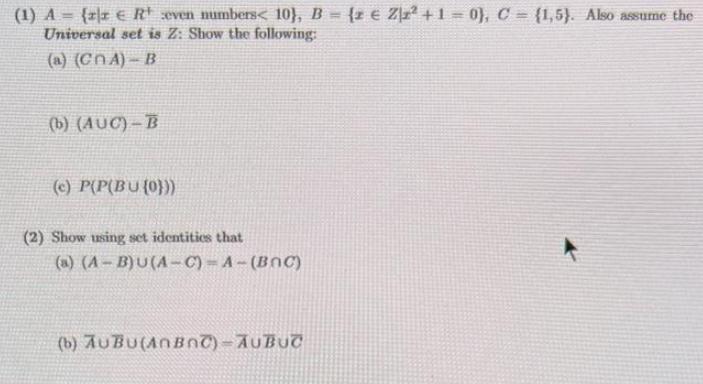Question
(1) A = {2 R even numbers < 10}, B = {z Zx + 1 = 0), C = {1,5}. Also assume the Universal

(1) A = {2 R even numbers < 10}, B = {z Z\x + 1 = 0), C = {1,5}. Also assume the Universal set is Z: Show the following: (a) (COA)-B (b) (AUC)-B (e) P(P(BU (0))) (2) Show using set identities that (a) (A-B)U(A-C)=A-(BOC) (b) AUBU(AnBnC)-AUBUT
Step by Step Solution
3.44 Rating (154 Votes )
There are 3 Steps involved in it
Step: 1
1 a To find COAB we first find the complement of A A x Z x is an odd number and x 10 Th...
Get Instant Access to Expert-Tailored Solutions
See step-by-step solutions with expert insights and AI powered tools for academic success
Step: 2

Step: 3

Ace Your Homework with AI
Get the answers you need in no time with our AI-driven, step-by-step assistance
Get StartedRecommended Textbook for
Income Tax Fundamentals 2013
Authors: Gerald E. Whittenburg, Martha Altus Buller, Steven L Gill
31st Edition
1111972516, 978-1285586618, 1285586611, 978-1285613109, 978-1111972516
Students also viewed these Accounting questions
Question
Answered: 1 week ago
Question
Answered: 1 week ago
Question
Answered: 1 week ago
Question
Answered: 1 week ago
Question
Answered: 1 week ago
Question
Answered: 1 week ago
Question
Answered: 1 week ago
Question
Answered: 1 week ago
Question
Answered: 1 week ago
Question
Answered: 1 week ago
Question
Answered: 1 week ago
Question
Answered: 1 week ago
Question
Answered: 1 week ago
Question
Answered: 1 week ago
Question
Answered: 1 week ago
Question
Answered: 1 week ago
Question
Answered: 1 week ago
Question
Answered: 1 week ago
Question
Answered: 1 week ago
View Answer in SolutionInn App



